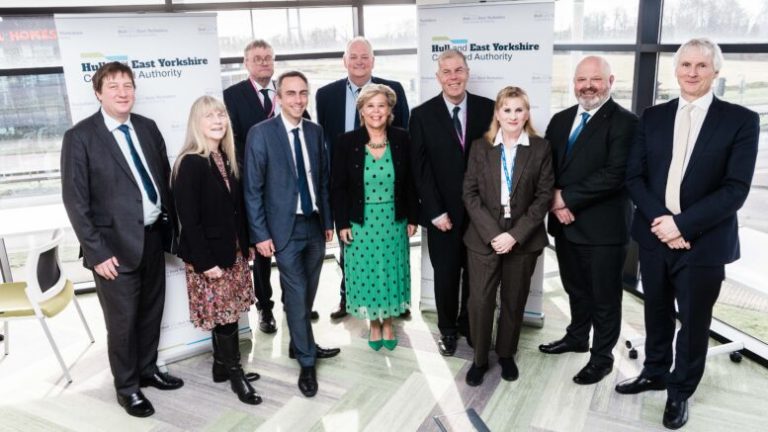Construction work will shortly begin on Doncaster’s Gateway One development, a new 52,000 sq ft Grade A office building on Trafford Way which is set to become Doncaster’s new digital tech hub.
Work on the £32m development, adjacent to Doncaster train station, will begin in April with completion expected in January 2027. The project is largely funded by the UK Government through the Doncaster Town Deal fund, and overseen by the Town Deal Board, a sub-group of the new city centre board.
The development supports Doncaster’s ambitions to grow a digital and tech cluster of national significance. The creation of a new, specialist digital tech hub and the businesses located there will revolve around digital technology, with global AI firm Automatic Analytics among the founding businesses set to take up residence.
Mayor of Doncaster, Ros Jones, said: “This pioneering building – right in the heart of Doncaster city centre at the train station gateway – is part of our plans to regenerate and modernise key areas of the city centre.
“Our aim is to create a new digital hub which will bring exciting new opportunities for Doncaster including jobs, economic growth, increased footfall and put Doncaster at the forefront of the changing economy and technological change as we strive to become a regional Artificial Intelligence (AI) Growth Zone.
“We want Doncaster to become a front runner in digital technology and we are already fast emerging as a centre of excellence for artificial intelligence (AI). This building will act as a magnet for leading digital and tech companies looking for opportunities to scale and grow their business to locate in Doncaster. The building will be a modern environment with improved public spaces and an extension to the recently regenerated railway forecourt.”
Chris Yates, Yorkshire director at Willmott Dixon, said:
“Our team of local commercial experts will bring a wealth of experience and innovation to Gateway One. In partnership with City of Doncaster Council, we will create a cutting-edge and sustainable hub where digital and technology businesses can thrive and grow in this city.
“We’re passionate that innovation will be a catalyst for creating opportunities for the people of Doncaster, so, in partnership with our proud local supply chain partners, we are committed to creating six new employment opportunities directly on the project.
“Through our bespoke ‘Building Lives Academy’ initiatives in collaboration with Advance Employment Hub, we also aim to deliver more than 650 hours of impactful employment support for local people furthest from the job market, those at risk of redundancy and those looking to transition into the construction industry.”
Tariq Shah OBE, CEO, Vigo Group, said: “This has been a great example of partnership working with colleagues across Doncaster’s public and private sectors supporting the bid for Town Deal funding.
“From the outset the aim was to deliver a high-quality development that kick started regeneration of the Station Gateway area and set the quality standards for new investment in to Doncaster on this important gateway site.”
Mark Taylor, CEO and Founder of Automated Analytics, said: “We are proud to be the anchor tenants of Gateway One as the opportunity to network, collaborate and scale in the City’s Innovation Hub is key to our growth and putting Doncaster firmly on the global map for technology and Artificial Intelligence.
“There is a ’secret sauce’ in Doncaster that enables impossible to become reality, and we look forward to the exciting next chapter that awaits with Gateway One the next milestone in Doncaster becoming a Centre of Excellence for Artificial Intelligence.”
Sally Jameson MP said: “I am delighted to hear that Automated Analytics, a proud Doncaster business, will be the anchor tenants of Gateway One. This is integral to Doncaster’s submission to become an AI Growth Zone, and will foster economic prosperity, innovation and excellence in AI in our city and South Yorkshire more widely.”
The Gateway One development has been designed to achieve net zero carbon emissions and will include an area of public open space. It will span across five floors with two commercial units on the ground floor which incorporate alfresco dining.












